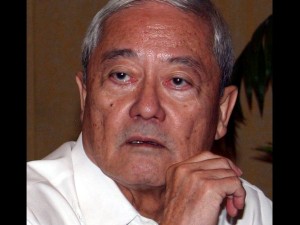Former Trade Minister Roberto V. Ongpin sold his stake in Philippine Bank of Communications, citing the need to make a “financial sacrifice” and spare the bank from any backlash that could arise from his legal battle with a ranking central bank official.
In a special block sale transacted on the Philippine Stock Exchange last Friday, Ongpin sold 6.13 million common shares and 15.36 million preferred shares of PBCom to Eric Recto, the bank chairman who is also his nephew, for P860 million.
The block sale represented 12.45 percent of PBCom’s share capital.
Recto, who is concurrent president of oil refiner Petron Corp., will pay for the shares on an installment basis.
This transaction makes Recto the single biggest stockholder in PBCom, hiking his interest to 29.52 percent from the previous 17.07 percent. Other key stockholders of the bank are Ralph Nubla (17.33 percent) and the Chung family’s Telengtan Brothers and Sons Inc. (10.66 percent).
“I regret having to sell out because I have always believed that PBCom has the clear potential to be a very successful bank,” Ongpin said in a statement. “However, I realize and accept that … I must undertake [this sacrifice]. Because of my decision to criticize the Bangko Sentral’s action against me, I have obligated myself to sell all my stock holdings, thus cutting off all ties with the bank, and allowing it to continue on its path to becoming one of this country’s strongest banks.”
Last week, Ongpin announced that he would file a criminal complaint against Bangko Sentral ng Pilipinas Deputy Governor Nestor Espenilla Jr. for allegedly violating the anti-graft law.
Ongpin described how Espenilla adopted a “contradictory” position regarding a 2009 loan transaction involving Development Bank of the Philippines and Philex Mining Corp.
Ongpin said that when the Court of Appeals recently decided to freeze his bank accounts—because of an ex-parte petition to the court signed by Espenilla—the former trade minister’s listed shares lost billions of pesos in market value.
Last week, Ongpin publicly criticized the Monetary Board for deferring his appointment to the board of PBCom.
Ongpin sold his stake in PBCom at P40 a share, a large discount to the market price of the stock. Still, he made a small profit, based on his original acquisition cost of the shares in 2011.
That year, the Ongpin-led group bagged a controlling stake in PBCom in a bidding supervised by state-owned Philippine Deposit Insurance Corp. In that P4.7-billion deal, Ongpin’s group acquired a 97.28-percent stake in the bank from the Luy, Nubla and Chung families, paying P27.88 a share.
Today, PBCom’s common shares are valued by the market at P79.80 each, while preferred shares are at P25 apiece.
“I was prepared to undertake this financial sacrifice in order to safeguard the interest of the bank because of the public statement I have made against the Monetary Board,” Ongpin said. “Since Eric doesn’t have P860 million lying around, I had to give him terms where he [made] a down payment of 10 percent, amounting to about P86 million, and the balance payable in three equal annual installments.”
Ongpin also resigned as director and co-chairman of PBCom, lamenting that the Monetary Board’s actions were “patently unfair.”
“When I announced that my lawyers had advised me that I had strong grounds to file a criminal case against Deputy Governor Nestor Espenilla, Jr., I am certain that this did not increase his “affection” for me. Therefore, it exacerbated the need for me to disassociate myself in every way from PBCom,” Ongpin said.
He also made it clear that he had “no rancor whatsoever” against the Bangko Sentral ng Pilipinas as an institution.
“I believe [the BSP] has done an outstanding job in the management of the currency and the banking system, contributing immensely to the excellent financial health that our economy is now experiencing,” Ongpin said.


